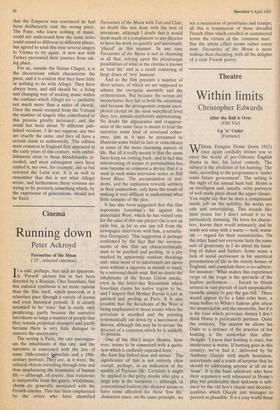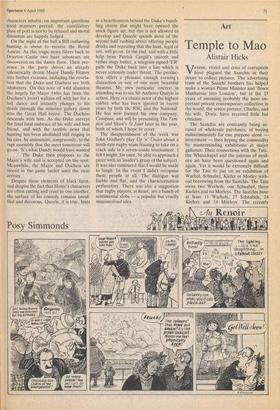Theatre
Within limits
Christopher Edwards
After the Ball is Over (Old Vic) Up 'n' Under (Fortune) William Douglas Home (born 1912) once again cordially invites you to enter the world of pre-Osborne English drama in this, his latest comedy. The subject is the abolition of fox hunting. The time, according to the programme is 'under some future government'. The setting is the night of the annual hunt ball. Home is an intelligent and, usually, witty purveyor of well made plays about the upper classes. You might say that he does a complaisant inside job on the nobility; his works are safe and entertaining. This sounds like faint praise but I don't intend it to be particularly damning. He loves his charac- ters, knows their world intimately and he sends you away with a warm — well, warm- ish — regard for their eccentricities. On the other hand not everyone feels the same sort of generosity as I do about his hand- ling of dukes and butlers. Some sense a lack of social pertinence in his uncritical presentation of life in the stately homes of England, and complain there is no subtext; for instance: 'What makes this experience verge on the tragic is the spectacle of the hapless performers . . . forced to thrash around in vain pursuit of such unspeakable twaddle simply to pay the gas bill.' There would appear to be a faint echo here, a mute halloo to Wilde's famous gibe about the unspeakable and the uneatable, but if it is the issue which provokes dismay I don't think Home is particularly partisan. Quite the contrary. The nearest he allows his Duke to a defence of the practice of fox hunting is the somewhat thin after- thought: 'I know that hunting is cruel, but intolerance is worse. if hunting goes in this country, we've had it,' delivered by Sir Anthony Quayle with much hesitation, uncertainty and a touch of surprise that he should be addressing anyone at all on an 'issue'. It is the hunt saboteurs who have their arguments well rehearsed in Home's play but predictably their spikiness is soft- ened by the old boy's charm and decency- qualities which Quayle just manages to present as plausible. It is a cosy world these
characters inhabit; on important questions good manners prevail, the conciliatory glass of port is not to be refused and moral dilemmas are happily fudged.
On the night of the ball a Bill outlawing hunting is about to receive the Royal Assent. As this tragic news filters back to Drayton Castle two hunt saboteurs are discovered on the dance floor. Their pre- sence in the party drives an already splenetically drunk Major Dandy Fitzroy into further excesses, including the revela- tion that the Duke and Duchess are both adulterers. On this note of wild abandon the hugely fat Major (who has been the Duchess's lover) waltzes off with her for a last dance and instantly plunges to his death through the minstrel gallery down into the Great Hall below. The Duchess descends with him. As the Duke surveys the final fatal embrace of his wife and best friend, and with the terrible news that hunting has been abolished still ringing in his ears, he announces, congruously, to the rapt assembly that the meet tomorrow will go on: 'It's what Dandy would have wanted . . . .' The Duke then proposes to the Major's wife and is accepted on the spot. Meanwhile, the Major and Duchess are stored in the game larder until the vicar arrives.
Despite these elements of black farce, and despite the fact that Home's characters are often cutting and cruel to one another, the surface of his comedy remains unruf- fled and decorous. Quayle, it is true, hints at a heartlessness behind the Duke's bumb- ling charm that might have opened the stock figure up, but this is not allowed to develop and Quayle spends most of the second half rushing about offering people drinks and repeating that the hunt, legal or not, will go on. In the end, and with a little help from Patrick Cargill's smooth and rather stagy butler, a telegram signed 'ER' pulls the Duke back into a line which is never seriously under threat. The produc- tion offers a pleasant enough evening's distraction in one of our most beautiful theatres. My own particular interest in attending was to see Sir Anthony Quayle in action. Here is a classic actor of the highest calibre who has been ignored in recent years by both the RSC and the National. He has now formed his own company, Compass, and will be presenting The Tem- pest and Shaw's St. Joan later in the year, both of which I hope to cover.
The disappointment of the week was John Godber's play Up 'n' Under about a tenth-rate rugby team training to take on a crack side in a seven-a-side tournament. I felt I might, for once, be able to approach a piece with an insider's grasp of the subject. It was also rumoured that I would be made to laugh. In the event I didn't recognise these people at all. The dialogue was feeble and flat, and the characterisation perfunctory. There was also a suggestion that rugby players, at heart, are a bunch of sentimental slobs — a popular but cruelly misconceived idea.











































 Previous page
Previous page